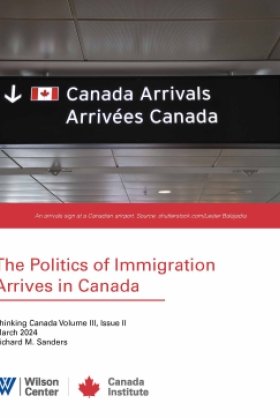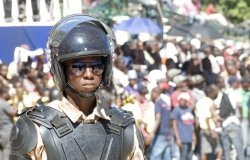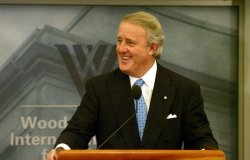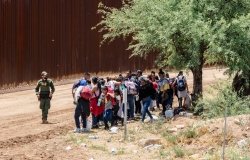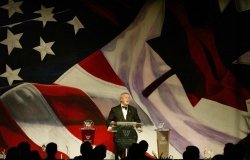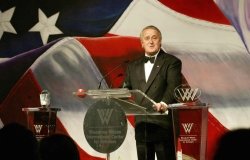Conference -- Chicago Council on Global Affairs' Task Force Report on Strengthening America: The Civic and Political Integration of Muslim Americans
Overview
M. Farooq Kathwari, Chairman, President and CEO, Ethan Allen Interiors, Inc.; Lynn M. Martin, former U.S. Congresswoman and U.S. Secretary of Labor; Peter Skerry, Professor of Political Science, Boston College; Ambassador Edward S. Walker, Jr., Adjunct Scholar, Middle East Institute; Daniel Benjamin, Director, Center on the United States and Europe, The Brookings Institution; Salam Al-Marayati, Executive Director, Muslim Public Affairs Council; Lee H. Hamilton, President and Director, Woodrow Wilson Center.
In February 2006, the Chicago Council on Global Affairs convened a Task Force of American Muslims and non-Muslims to explore the ways in which Muslim Americans can be better integrated into this nation's civic and political life. After meeting over the course of 18 months, the Task Force, in conjunction with the Division of United States Studies, presented its report to the public on June 26, 2007.
Task Force co-chair Lynn Martin emphasized that the report "is as much about America as it is about the Muslims in it" and added, "America will be less if this process [of Muslim integration] is not accelerated." The report contains recommendations for both Americans who are Muslim and those who are not. It suggests, for example, that Muslim Americans should amplify their condemnation of terrorism, and that the American government should both do more to acknowledge the contributions of Muslim Americans to national security and increase its sensitivity training for federal law enforcement personnel. Some of the suggestions, such as the creation of an ongoing National Diversity Dialogue composed of Muslims and non-Muslims, Martin said, can be accomplished within two years.
Co-chair Farooq Kathwari reminded the audience that the Muslim American population is extremely diverse. Approximately 25 percent are African American and over 60 percent are first generation immigrants from 80 countries. On average, Muslim Americans have higher incomes and more years of education than the general populace. Unlike European Muslims, Muslim Americans are not marginalized economically. Of the 66 percent of American Muslims who are under age 29, however, 40 percent reported experiencing discrimination in the years since 9/11. The potential for alienation exists, and the Task Force recommends making leadership development of young Muslim Americans a priority for Muslim-American organizations, governments at the federal, state and local levels, and think tanks.
The program included three discussants who were not members of the Task Force. Praising the Task Force Report as a whole, Ambassador Edward Walker said that it raises unanswered questions. The first is how to undo the negative image of Muslims and Arabs projected by the American entertainment industry. While the report addresses the issue – suggesting, for example, that media organizations and Muslim American groups jointly sponsor education seminars, and that journalism schools offer scholarships to young Muslims – Walker considers that insufficient. When he was Ambassador to Egypt, the Egyptian government attempted to curtail anti-Semitic cartoons featured in the popular media, and Walker wondered if the American government might both adopt a similar system to promote positive images of Muslims in the United States and pressure Arab governments to promote positive images of Americans in Arab countries. He also believes that any program for American Muslim integration is incomplete if it does not pay attention to what is happening in the Middle East. Finally, Walker suggested that implementation of all the Task Force's recommendations might require $4-5,000,000 a year, and asked both if raising that amount is realistic and if the organizations that could be useful in the integration effort have an infrastructure sufficient to be effective.
Daniel Benjamin compared Muslim integration in the United States to that of western Europe, where one third to one half of Muslim youth leave school without solid employment qualifications and in any event face serious employment discrimination. By comparison, the United States has a long and successful history of integrating immigrants. The relative lack of terrorist plots uncovered in this country, Benjamin declared, is due to the fact that the Muslim community has been our first line of defense, working with law enforcement agencies, and that it is comparatively well integrated. Nonetheless, saying that Islam has been substituted for the Soviet Union as the key external enemy for Americans, he pointed to discrimination against American Muslims and the rising level of Islamophobia here, and argued that these phenomena can be combated only through greater involvement of Muslims in the political process.
Peter Skerry also found many of the Task Force recommendations laudable. While acknowledging the many external barriers to Muslim political participation, he emphasized that some, such as Muslim disaffection with popular American cultural values, come from within the Muslim community. He also found a tension between the Task Force's two recommendations for building stronger Muslim civic and political institutions and for further integration, noting that while immigrants to this country have historically built their own institutions, those institutions have been seen by others as separatist statements.
Salam al-Marayati, who was a member of the Task Force, pointed to the active involvement of Muslims in it as indicative of the community's desire to participate in all aspects of American life. Muslims, he said, "have accepted America as our home." They are involved in such endeavors because they want to oppose discrimination and desire to serve both their country and their faith. "Being a good Muslim makes me a good American, and being a good American makes me a good Muslim," he stated. Muslim Americans also want to take the lens of this country away from the small number of extremists and focus it on more mainstream Muslims and activities such as the medical clinic, open to people of all faiths, that Muslims have established in Los Angeles. Al-Marayati urged more dialogues and joint endeavors, along the lines of the interfaith Muslim-Jewish youth activities that have also been organized in Los Angeles.
The report of the Task Force is available at
http://www.thechicagocouncil.org/UserFiles/File/Task%20Force%20Reports/Strengthening%20America%20Report.pdf.
An Executive Summary is available at
http://www.thechicagocouncil.org/UserFiles/File/Task%20Force%20Reports/Strengthening%20America%20Exec%20Summary.pdf.
Philippa Strum, Director of United States Studies 202-691-4129
Thank you for your interest in this event. Please send any feedback or questions to our Events staff.


